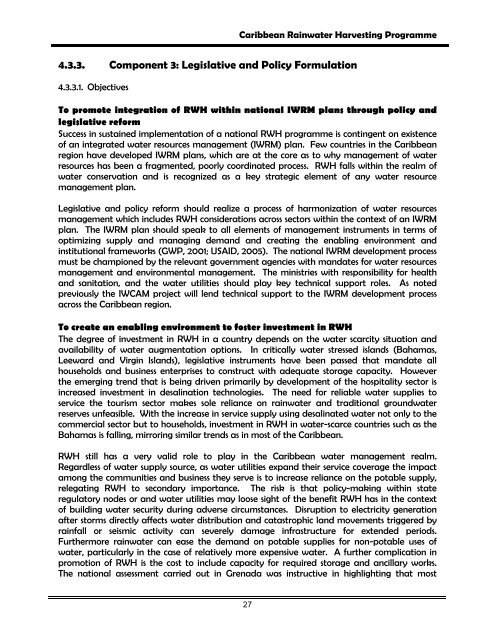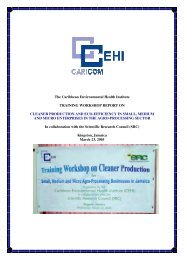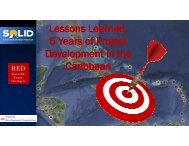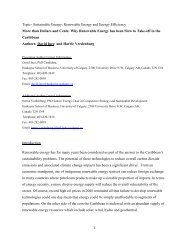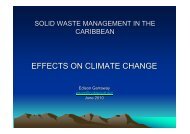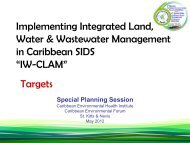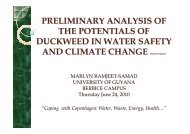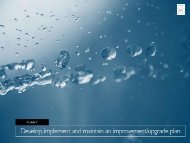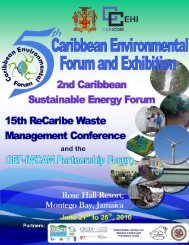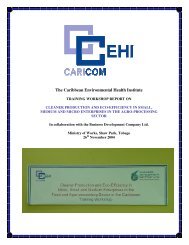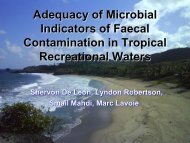A programme for Promoting Rainwater Harvesting in the Caribbean
A programme for Promoting Rainwater Harvesting in the Caribbean
A programme for Promoting Rainwater Harvesting in the Caribbean
You also want an ePaper? Increase the reach of your titles
YUMPU automatically turns print PDFs into web optimized ePapers that Google loves.
<strong>Caribbean</strong> <strong>Ra<strong>in</strong>water</strong> <strong>Harvest<strong>in</strong>g</strong> Programme4.3.3. Component 3: Legislative and Policy Formulation4.3.3.1. ObjectivesTo promote <strong>in</strong>tegration of RWH with<strong>in</strong> national IWRM plans through policy andlegislative re<strong>for</strong>mSuccess <strong>in</strong> susta<strong>in</strong>ed implementation of a national RWH <strong>programme</strong> is cont<strong>in</strong>gent on existenceof an <strong>in</strong>tegrated water resources management (IWRM) plan. Few countries <strong>in</strong> <strong>the</strong> <strong>Caribbean</strong>region have developed IWRM plans, which are at <strong>the</strong> core as to why management of waterresources has been a fragmented, poorly coord<strong>in</strong>ated process. RWH falls with<strong>in</strong> <strong>the</strong> realm ofwater conservation and is recognized as a key strategic element of any water resourcemanagement plan.Legislative and policy re<strong>for</strong>m should realize a process of harmonization of water resourcesmanagement which <strong>in</strong>cludes RWH considerations across sectors with<strong>in</strong> <strong>the</strong> context of an IWRMplan. The IWRM plan should speak to all elements of management <strong>in</strong>struments <strong>in</strong> terms ofoptimiz<strong>in</strong>g supply and manag<strong>in</strong>g demand and creat<strong>in</strong>g <strong>the</strong> enabl<strong>in</strong>g environment and<strong>in</strong>stitutional frameworks (GWP, 2001; USAID, 2005). The national IWRM development processmust be championed by <strong>the</strong> relevant government agencies with mandates <strong>for</strong> water resourcesmanagement and environmental management. The m<strong>in</strong>istries with responsibility <strong>for</strong> healthand sanitation, and <strong>the</strong> water utilities should play key technical support roles. As notedpreviously <strong>the</strong> IWCAM project will lend technical support to <strong>the</strong> IWRM development processacross <strong>the</strong> <strong>Caribbean</strong> region.To create an enabl<strong>in</strong>g environment to foster <strong>in</strong>vestment <strong>in</strong> RWHThe degree of <strong>in</strong>vestment <strong>in</strong> RWH <strong>in</strong> a country depends on <strong>the</strong> water scarcity situation andavailability of water augmentation options. In critically water stressed islands (Bahamas,Leeward and Virg<strong>in</strong> Islands), legislative <strong>in</strong>struments have been passed that mandate allhouseholds and bus<strong>in</strong>ess enterprises to construct with adequate storage capacity. However<strong>the</strong> emerg<strong>in</strong>g trend that is be<strong>in</strong>g driven primarily by development of <strong>the</strong> hospitality sector is<strong>in</strong>creased <strong>in</strong>vestment <strong>in</strong> desal<strong>in</strong>ation technologies. The need <strong>for</strong> reliable water supplies toservice <strong>the</strong> tourism sector makes sole reliance on ra<strong>in</strong>water and traditional groundwaterreserves unfeasible. With <strong>the</strong> <strong>in</strong>crease <strong>in</strong> service supply us<strong>in</strong>g desal<strong>in</strong>ated water not only to <strong>the</strong>commercial sector but to households, <strong>in</strong>vestment <strong>in</strong> RWH <strong>in</strong> water-scarce countries such as <strong>the</strong>Bahamas is fall<strong>in</strong>g, mirror<strong>in</strong>g similar trends as <strong>in</strong> most of <strong>the</strong> <strong>Caribbean</strong>.RWH still has a very valid role to play <strong>in</strong> <strong>the</strong> <strong>Caribbean</strong> water management realm.Regardless of water supply source, as water utilities expand <strong>the</strong>ir service coverage <strong>the</strong> impactamong <strong>the</strong> communities and bus<strong>in</strong>ess <strong>the</strong>y serve is to <strong>in</strong>crease reliance on <strong>the</strong> potable supply,relegat<strong>in</strong>g RWH to secondary importance. The risk is that policy-mak<strong>in</strong>g with<strong>in</strong> stateregulatory nodes or and water utilities may loose sight of <strong>the</strong> benefit RWH has <strong>in</strong> <strong>the</strong> contextof build<strong>in</strong>g water security dur<strong>in</strong>g adverse circumstances. Disruption to electricity generationafter storms directly affects water distribution and catastrophic land movements triggered byra<strong>in</strong>fall or seismic activity can severely damage <strong>in</strong>frastructure <strong>for</strong> extended periods.Fur<strong>the</strong>rmore ra<strong>in</strong>water can ease <strong>the</strong> demand on potable supplies <strong>for</strong> non-potable uses ofwater, particularly <strong>in</strong> <strong>the</strong> case of relatively more expensive water. A fur<strong>the</strong>r complication <strong>in</strong>promotion of RWH is <strong>the</strong> cost to <strong>in</strong>clude capacity <strong>for</strong> required storage and ancillary works.The national assessment carried out <strong>in</strong> Grenada was <strong>in</strong>structive <strong>in</strong> highlight<strong>in</strong>g that most27


